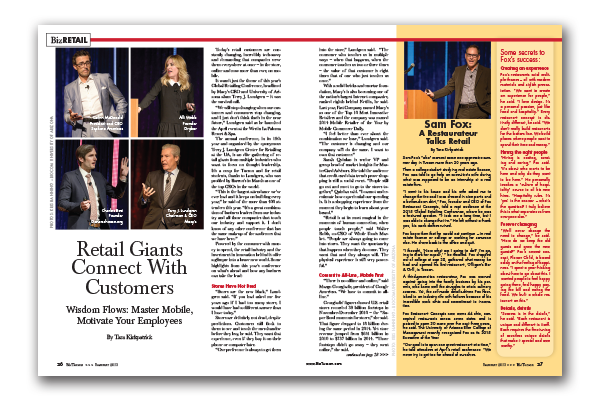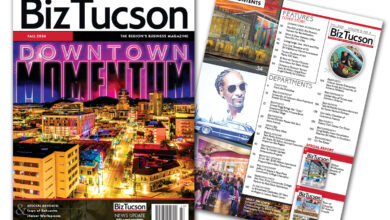
Global Retailing Conference
By Tara Kirkpatrick –
Global Retailing Conference
Retail Giants Connect With Customers
Wisdom Flows: Master Mobile, Motivate Your Employees
Today’s retail customers are constantly changing, incredibly tech-savvy and demanding that companies serve them everywhere at once – in the store, online and now more than ever, on mobile.
It wasn’t just the theme of this year’s Global Retailing Conference, headlined by Macy’s CEO and University of Arizona alum Terry J. Lundgren – it was the survival call.
“We will stop changing when our customers and consumers stop changing, and I just don’t think that’s in the near future,” Lundgren said as he launched the April event at the Westin La Paloma Resort & Spa.
The annual conference, in its 19th year and organized by the eponymous Terry J. Lundgren Center for Retailing at the UA, is an elite gathering of retail giants from multiple industries who want to focus on thought leadership. It’s a coup for Tucson and for retail students, thanks to Lundgren, who was profiled by Barron’s in March as one of the top CEOs in the world.
“This is the largest attendance we’ve ever had and it keeps on building every year,” he said of the more than 400 attendees this year. “It’s a great combination of business leaders from our industry and all those companies that touch our industry and support it. I don’t know of any other conference that has the same makeup of the audiences that we have here.”
Powered by the consumer with money to spend, the retail industry and the investment in innovation behind it offer a glimpse into a brave new world. Some highlights from this year’s conference on what’s ahead and how any business can take the lead:
Stores Have Not Died
“Stores are the new black,” Lundgren said. “If you had asked me five years ago if I had too many stores, I would have had a different answer than I have today.”
Stores are definitely not dead, despite predictions. Customers still flock to them to see and touch the merchandise before they buy, he said. They want that experience, even if they buy it on their phone or computer later.
“Our preference is always to get them into the store,” Lundgren said. “The consumer who touches us in multiple ways – when that happens, when the consumer touches us two or three times – the value of that customer is eight times that of one who just touches us once.”
With a solid bricks-and-mortar foundation, Macy’s is also becoming one of the nation’s largest Internet companies, ranked eighth behind Netflix, he said. Last year, Fast Company named Macy’s as one of the Top 10 Most Innovative Retailers and the company was named 2014 Mobile Retailer of the Year by Mobile Commerce Daily.
“I feel better than ever about the combination we have,” Lundgren said. “The customer is changing and our company will do the same. I want to own that customer.”
Sarah Quinlan is senior VP and group head of market insights for MasterCard Advisors. She told the audience that credit card data trends prove shopping is still a social event. “People still go out and meet to go to the stores together,” Quinlan said. “I cannot underestimate how experiential our spending is. It is a shopping experience from the moment they begin to learn about your brand.”
“Retail is at its most magical in the moments of human connection, when people touch people,” said Walter Robb, co-CEO of Whole Foods Market. “People are always going to come into stores. They want the spontaneity that happens when they do come. They want that and they always will. The physical experience is still very powerful.”
Commit to All-Line, Mobile First
“There is no offline and online,” said Margo Georgiadis, president of Google Americas. “We have to commit to all-line.”
Georgiadis’ figures showed U.S. retail stores recorded 39 billion footsteps in November-December 2010 – the “Super Bowl moments for stores,” she said. That figure dropped to 18 billion during the same period in 2014. Yet store revenue jumped from $641 billion in 2010 to $737 billion in 2014. “Those footsteps didn’t go away – they went online,” she said.
“Customers are more focused than they’ve ever been,” said Georgiadis. “They go into the store ready to buy. What’s changed is how consumers are going to make their decisions. If you want to win the war on traffic, you have to win before the store. That’s what technology is about.” For example, Walgreens’ mobile customers spend six times more in the store than their retail-only counterparts, she said.
Retailers must make it easy for customers to shop everywhere, she said, creating a cohesive brand experience – all-line. They also must be vigilant about keeping pace with their tech-centric customers. Georgiadis said she’s surprised how many company leaders don’t watch YouTube videos by their own customers trying out their products. It’s instant market research, she said.
Most importantly, retailers must master mobile, the device that customers rely on 24 hours a day, seven days a week. For example, Sephora updated its mobile app to enable customers to virtually sample contouring products while in the store, a paint-by-numbers for the face. “These are simply magic moments. Are you providing helpful curated experiences to deliver magic?”
“Mobile is the way we are innovating,” said Martine Reardon, Macy’s chief marketing officer. “It is everywhere our customer is. Mobile is what we think first and then we go to everywhere else.” She heralded Macy’s apps that let customers do an image search for an item they want, check out via mobile and do in-store research. Macy’s is also testing an app called Macy’s Go that would let a customer select colors and style of items, which would then be sent to a dressing room.
Value, Empower Employees
“The Container Store is built upon putting employees first,” said Kip Tindell, chairman & CEO of the niche organizing store that opened in Tucson in May. “We’ve really built our brand on that. If you hire great people, you get three times the productivity.”
Tindell said that people work more than they do anything else in their lives. “Feeling great about yourself at work – we employers can do so much about that – building the employee who gets out of bed and looks forward to coming into work in the morning,” he said. “So much of our sense of self-worth is about what we do at work and how well we do at work.
“I feel we have 90 percent productivity at The Container Store. People tend to not like The Container Store – they tend to love it and they get emotional about it.”
Alli Webb, founder of Drybar, a premier chain of 42 blow dry salons, emphasized that her stylists are the core of her business. “It’s really about the people. I wanted this environment to feel like a family business. To that end, Drybar’s core values include humility and honesty, having fun, kindness and making a difference in their customers’ lives,” Webb said.
“You gotta have fun,” she said. “We work so much. There’s so much to do, but when you are passionate about what you are doing, it doesn’t feel like work.”
Robb, of Whole Foods, agreed. “People are the heart and soul of a company,” he said. “The people bring the values, purpose and mission alive. It’s where a company lives. The humanity of a company lives in its team. Invest in your people.”





